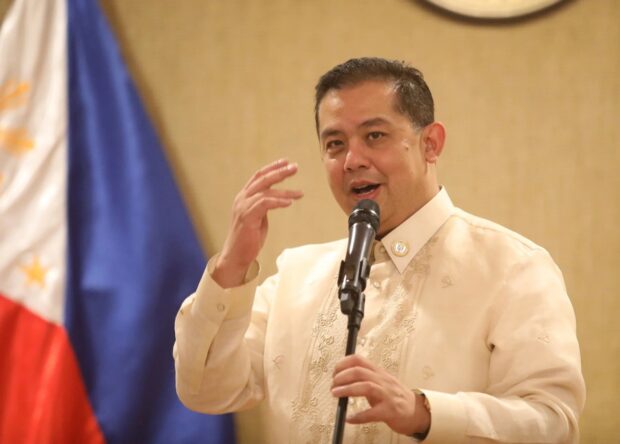
FILE PHOTO: House Speaker Martin Romualdez. Photo from the official website of House of Representatives / congress.gov.ph
MANILA, Philippines — House Speaker Ferdinand Martin Romualdez believes the country may still hit the targeted six percent gross domestic product (GDP) growth rate in 2023, with holiday spending being key to this projected upward movement.
Romualdez in a statement on Thursday said that increased spending during the Christmas season and the higher disbursements from the government, to complete projects for the year, may allow the country to hit targets.
The Speaker said this after the Philippine Statistics Authority (PSA) said that the economy grew by 5.9 percent in the third quarter of 2023. While this was a faster growth compared to the 4.3 percent rate registered for the second quarter of this year, it only brought the country’s year-to-date average growth to 5.5 percent.
Already-reduced growth rate expectations for 2023 were around 6.0 percent to 7.0 percent.
“The government is the principal driver of growth. We expect state offices to ramp up project and program implementation and activities,” Romualdez said.
“Funds released to them are meant to be spent, not saved, though expenditures should comply with relevant accounting, auditing, transparency, and accountability regulations,” he added.
READ: PH economy grew by 5.9% in Q3
READ: Philippines cuts 2023 GDP growth target to 6.0-7.0%
Romualdez on the other hand said the House would not “hesitate to exercise its oversight power to check on the spending of agencies.”
According to the Speaker, it is important for the government to start speeding up spending because Socioeconomic Planning Secretary Arsenio Balisacan said that the country’s economy should grow by 7.2 percent in the fourth quarter for it to hit the 6.0 percent target.
This, he said, is possible considering that the country’s economy grew faster under President Ferdinand Marcos Jr.’s administration.
“It’s a difficult challenge, but let’s do the most we can to hit the target. Let us not be distracted by political noise. Let’s continue supporting President BBM in achieving economic prosperity for our people,” Romualdez said.
“So 7.2 percent is a fairly achievable goal. It’s not an impossible dream,” he added.
Albay 2nd District Rep. Joey Salceda agreed with Romualdez’s call for quicker government spending, saying that the government’s catch-up plan would allow the country to sustain the momentum of economic growth.
According to Salceda, an economist by profession, government offices should not spend vigorously as the spending ban required by the Barangay and Sangguniang Kabataan Elections (BSKE) has been lifted.
“We have to sustain the government’s spending catchup plan, especially at the local government unit level. Budgeted programs and plans there were put on hold because of the Barangay and SK Election spending ban should be pursued vigorously to completion this year,” Salceda, who heads the House committee on ways and means, said.
“We need to keep working on agricultural growth, however. For the sector to maintain its peso-level contribution to GDP per capita, it should grow by at least 2 percent every year. Average growth so far this year has been 1.1 percent. The appointment of a DA Secretary who comes from the leading investment drivers of the agriculture sector should bolster the effort to meet this target,” he added.
Senior Deputy Speaker and Pampanga 3rd District Rep. Aurelio Gonzales Jr. also shared this optimistic view, reasoning that workers tend to get more money by the end of the year due to bonuses — which indicate that people would spend more.
In relation to this, Gonzales also noted that overseas workers usually send bigger amounts to their relatives in the Philippines, thus increasing chances of a better economic performance for the fourth quarter.
Last August 30, it was reported by the Philippine Daily Inquirer that growth projections have been cut further because of high inflation rates, which are expected to weigh down Philippine output.
According to a GlobalSource Partners repor penned by Romeo Bernardo and Marie Christine Tang, the forecast growth of Philippine gross domestic product (GDP) for this year has been reduced to 5.2 percent.
However, Bangko Sentral ng Pilipinas Governor Eli Remolona Jr. said on the same month that they expect the economy to pick up its pace and hit the six percent target.